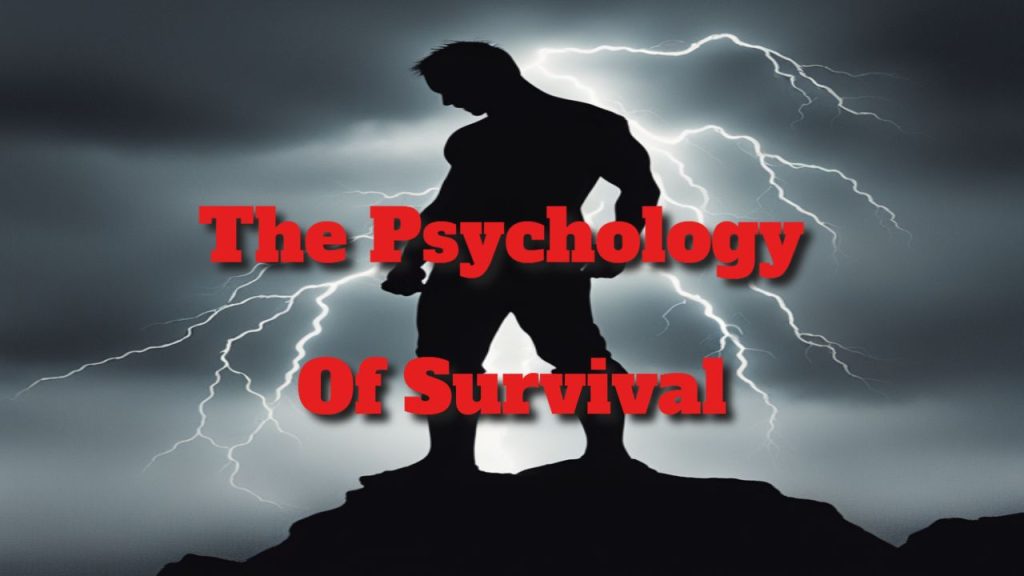Discover Proven Techniques to Master Survival Psychology in High-Stress Environments
The saying “desperate times call for desperate measures” encapsulates the crucial essence of survival, particularly as we delve into the intricate layers of survival psychology. When confronted with serious threats, the human psyche undergoes a remarkable transformation, unlocking profound reservoirs of strength and resilience that typically lie dormant in our daily lives. This transformation goes beyond simple reaction; it signifies a thorough mobilization of both our mental and emotional capacities, illustrating the incredible potential of our minds when faced with adversity. Grasping these psychological shifts is essential for anyone aiming to bolster their survival skills and enhance their mental resilience, making it a vital area of study for emergency preparedness and personal development.
In life-threatening situations, a sophisticated array of psychological mechanisms activate within our minds. What exactly happens internally when every moment is critical? How do we make crucial decisions amidst overwhelming pressure? Furthermore, how does our inherent psychological framework shape our ability to endure, adapt, and ultimately thrive in chaotic circumstances? These questions are pivotal to understanding the dynamics of survival psychology, which we will explore in depth throughout this insightful article. By illuminating the core elements that empower us to withstand pressure, we can gain valuable perspectives on our innate capabilities and behavioral responses during crises, enhancing our preparedness and resilience.
Join us on a fascinating journey into the captivating realm of survival psychology, where we will unpack its complexities and reveal the essential factors that determine our ability to overcome challenges and achieve success in perilous situations.
Understanding How Fear Shapes Our Survival Instincts and Responses
Fear is a fundamental component of our survival instincts, acting as a primal response that equips our bodies to react swiftly to potential threats. This intense emotion initiates a cascade of physiological responses designed to improve our chances of survival during dangerous encounters. When fear grips us, significant physiological changes occur: our heart rate increases, breathing becomes rapid, and muscles tense, creating an elevated state of alertness that prepares us for immediate action. Recognizing this physiological response is crucial for anyone seeking to enhance their survival instincts and reaction capabilities.
This heightened readiness sharpens our reflexes and accelerates decision-making, empowering us to confront imminent dangers effectively. Furthermore, fear enhances our sensory perception, allowing us to detect our surroundings more acutely and identify potential threats that might otherwise go unnoticed. It compels us to focus intently on our environment, increasing vigilance and helping us recognize critical warning signs for survival. Without the influence of fear, our ability to navigate hazardous scenarios could be significantly compromised, underlining its indispensable role in our survival toolkit. By understanding the intricate interplay between fear and survival mechanisms, we deepen our appreciation for the complexities of human experience while equipping ourselves with practical knowledge that can be applied in real-life situations.
Building Resilience to Effectively Conquer Life’s Challenges
In the face of fear during high-stakes scenarios, the ability to cultivate resilience becomes essential for maintaining the fight for survival. Resilience is defined as the capacity to recover from adversity, adapt to challenges, and bounce back from setbacks, even when confronted with overwhelming obstacles. This vital quality often distinguishes those who succumb to despair from those who summon the inner strength to persevere in their survival efforts. Actively developing resilience is a constructive step anyone can take to enhance their overall life experience and improve their ability to face difficulties.
However, resilience does not mean the absence of fear or pain; rather, it embodies the steadfast determination to move forward despite emotional upheaval. It involves nurturing a positive mindset, establishing realistic goals, and skillfully utilizing available resources to navigate through hardships. By fostering resilience, individuals empower themselves to confront life’s challenges with confidence, armed with the insights and strategies necessary for success. This transformative mindset is not only beneficial in survival contexts but also enriches one’s broader life experience, instilling hope and enabling individuals to tackle future challenges with renewed vigor and determination.
Enhancing Decision-Making Skills Under Pressure for Superior Outcomes
The ability to make informed decisions is often severely compromised in high-stress environments. The inherent urgency and pressure characteristic of critical moments can cloud our judgment, leading to impulsive or poorly thought-out choices. During episodes of extreme stress, the brain enters a heightened state of arousal, triggering the fight-or-flight response, which can overwhelm rational thought processes and push individuals to rely more on instinct rather than reasoned analysis. Recognizing these patterns is crucial for developing effective strategies to improve decision-making.
This physiological response can significantly hinder cognitive functions, making it increasingly challenging to process information and weigh the pros and cons of various options. To combat these effects, it is essential to understand how stress impacts decision-making and to actively employ strategies that mitigate its influence. Techniques such as practicing deep breathing exercises, allowing brief moments for reflection, or seeking advice from trusted individuals can greatly enhance one’s capacity to make informed and effective decisions. By honing decision-making skills in high-pressure situations, individuals can dramatically improve their chances of successfully navigating through challenging and potentially life-threatening scenarios.
The Crucial Importance of Social Support During Crisis Management
Recognizing the importance of social support is vital for effectively managing stressful circumstances. A strong network of friends, family, and colleagues provides invaluable assistance and resources, enabling individuals to cope and thrive in challenging times. The emotional backing, practical help, and sense of community offered by social connections are essential for fostering resilience and enhancing overall well-being. In any crisis, the strength derived from social support can dramatically alter the course of one’s experience.
Research consistently shows that individuals with solid social networks experience better mental health outcomes and recover more quickly from traumatic experiences. Additionally, having a reliable support system enhances problem-solving abilities, introduces new perspectives, and provides essential motivation and encouragement. Acknowledging the transformative power of social networks during times of crisis can significantly improve one’s experience, allowing individuals to draw strength and insights from others when faced with adversity. Engaging with a supportive community not only aids in coping with immediate challenges but also fosters long-term emotional resilience and recovery, reinforcing the idea that we are not alone in our struggles.
 Effective Practical Coping Strategies for High-Stress Situations
Effective Practical Coping Strategies for High-Stress Situations
What practical strategies can be implemented to successfully navigate life-threatening situations? Here are some actionable tips:
– Maintain Calmness and Focus: Take a moment to breathe deeply while assessing your surroundings before taking action. This approach can help clarify your thoughts and sharpen your focus.
Prioritize Safety: Protect yourself and others by seeking shelter or moving away from immediate threats whenever possible. Your safety must always take precedence.
– Stay Aware: Remain vigilant regarding your surroundings, paying close attention to potential dangers or changes in the environment that could affect your safety.
– Communicate Clearly: If necessary, signal for help or inform others of the danger you are facing. Clear communication is crucial in survival scenarios.
– Trust Your Instincts: Rely on your gut feelings and make prompt decisions based on the information available to you. Your instincts can provide invaluable guidance.
– Utilize Available Resources: Maximize the use of all accessible tools and support systems to increase your chances of survival, whether they be physical resources or social support.
– Maintain an Optimistic Mindset: Foster a belief in your ability to overcome adversity. A positive outlook can significantly enhance your resilience and response to challenges.
Effective Coping Strategies for Trauma Survivors and Individuals with PTSD
For those with a history of trauma or PTSD, implementing effective coping strategies during life-threatening situations is essential for managing anxiety and fostering resilience. Customizing these strategies can empower individuals to regain control over their responses and navigate crises more effectively.
– Practice Deep Breathing Techniques: Utilize grounding strategies to stabilize anxiety levels and cultivate a sense of calm. Deep breathing can help center your thoughts and mitigate panic.
– Seek Social Support: Don’t hesitate to reach out to friends, family, or mental health professionals for assistance. Connecting with others can provide critical support during challenging times.
– Engage in Self-Care Practices: Prioritize activities that enhance mental and physical well-being, supporting recovery and resilience building over time.
These coping mechanisms are vital for managing anxiety and cultivating resilience. It’s important to recognize that resilience is not merely an inherent trait; it can be actively nurtured through consistent practice and support. With the right strategies in place, anyone—regardless of their background—can enhance their capacity to recover from adverse situations.
Moreover, understanding how decision-making under stress influences long-term mental health and recovery from traumatic events is critical. The manner in which decisions are made during high-pressure situations can significantly shape recovery trajectories and overall mental health in the aftermath of life-threatening experiences.
Identifying the psychological barriers individuals face when seeking social support during crises is equally important. Common challenges during these pivotal moments may include feelings of vulnerability, fear of judgment, trust issues, and difficulties in expressing one’s needs. Acknowledging these obstacles is essential, as they can hinder the process of seeking help and exacerbate stress and anxiety.
To effectively navigate these hurdles and access the necessary support, consider taking manageable steps such as confiding in a trusted friend, consulting a mental health professional, or joining a support group. Remember, seeking help is a courageous step, and there are people ready and willing to assist you when you need it most.
Exploring the Fascinating World of Survival Psychology
The psychology of survival represents a rich and multifaceted area of exploration that offers profound insights into human behavior. While anxiety is a natural response to life-threatening events, resilience is what empowers us to recover from adversity and continue moving forward. By understanding how stress affects decision-making, we can substantially enhance our chances of survival. Furthermore, acknowledging the vital role of social support provides the essential strength and comfort needed during challenging times.
Utilizing effective coping strategies enables us to navigate complex and life-threatening situations more adeptly, ultimately leading to enhanced resilience and improved mental health outcomes. This exploration of survival psychology not only deepens our understanding of our capabilities but also equips us with practical tools necessary to confront unforeseen challenges with confidence and tenacity.
Frequently Asked Questions About Survival Psychology
How do anxiety disorders affect survival psychology?
What psychological differences exist in survival responses between individuals with anxiety disorders and those without?
Individuals with anxiety disorders may exhibit heightened reactions to fear and stress, while those without can engage in more adaptive coping strategies, leading to varying survival outcomes.
What are the most effective coping strategies for trauma survivors or individuals with PTSD during survival scenarios?
The Article Survival Psychology: Understanding the Mindset Appeared First On Survival Avenue.
The post Survival Psychology: Mastering the Mindset appeared first on Survival Bite.
The Article Survival Psychology: Unlocking Your Mental Resilience Was Found On https://limitsofstrategy.com

Comments are closed